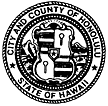
STAR-BULLETIN FILE
A controversial proposal to increase city bus fares will be discussed at the City Council's Budget Committee today and tomorrow. The plan would raise the adult fare 25 cents to $1.75, and increase a four-day visitor pass to $20 from $15.
Bus riders resigned
to increase in faresA proposed 25-cent rise will not
affect ridership, city says
Kale Rego, of Pauoa, doesn't like the idea of paying 25 cents more each time he catches TheBus.
"They shouldn't raise it," Rego, 30, said about a proposal by the City Council to hike single adult fares to $1.75. "It's already expensive."
But Rego was like others waiting at the bus stop at Beretania and Punchbowl streets who said that despite the price increase, they would still ride the bus because that's their main mode of transportation.
Because revenues from bus fares fell below 27 percent of the costs to run TheBus system, the administration asked the Council for a $3 increase in the monthly adult pass to $30. It is expected to bring in an extra $2.4 million in revenue.
Ridership will likely not suffer if the fare hike goes through, city Transportation Director Cheryl Soon said.
That's because it would take fewer trips to justify buying a monthly pass. Under the current fares, 20 trips would be needed to break even with the $30 proposed cost. But with the $1.75-per-ride fare, the break-even point moves down to 17 trips.
"That flip-over point comes at 17 trips instead of 20, so we've had to account for a certain number of people switching over to the monthly pass," Cheryl Soon said. "In reality we get less money from a passenger on a monthly pass than a person who's taking trip by trip."
The Council estimates that the increase in single adult fares would bring in $1.7 million to help balance the city's $1.2 billion operating budget. The Council is also raising the four-day pass used by visitors to $20 from $15.
The Council's Budget Committee will take up the budget and related fee and tax proposals today and tomorrow.
Soon said her department's calculations show that the Council's revenue projections for the single bus fare increase are "much higher than ours," but she would not say what her calculations came to until she has had a chance to talk to Council members to find out what they based their numbers on.
"We're trying to get in touch with them because our numbers don't match the numbers that they say would be coming into our budget, so that obviously would give us some concern," Soon said late yesterday afternoon. "That's the part that worries me because my budget depends on getting that revenue, and if it doesn't materialize, then it's the equivalent of getting a budget cut."
She said then she will be able to determine whether "we just have an honest difference of a view or if we have a real problem."
Bus fares last went up in July 2000. Soon said that the last fare increase was modest enough then that the bus did not lose ridership, but passengers were lost following the economic downturn caused two months later by the Sept. 11, 2001, terrorism. "If you don't have a job, you don't need to catch the bus to get to work."
The art of revenue projection has become a source of disagreement between the Council and the administration.
Both the Council and the Harris administration have accused each other of jacking up revenue projections to justify a balanced budget.
Council Budget Chairwoman Ann Kobayashi has said that she believes that estimated revenues connected to some of the administration's fee proposals are too high.
Earlier this week, Budget Director Ivan Lui-Kwan called the Council's $1.4 million revenue projection for fees charged for use of certain parks as "wildly overstated."
Kobayashi said the projection is based on the cost of annual maintenance, figures provided by the administration.
The administration also chastised the Council for "double counting" potential revenue from the sale of a downtown municipal parking lot and fees charged at the Blaisdell arena.
The mayor has said that $15 million to represent the parking lot sale is already in the current budget and will be carried forward to next year's budget because the lot still has not sold.

